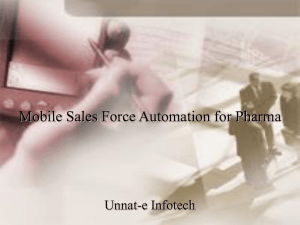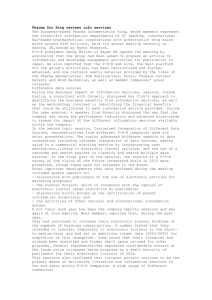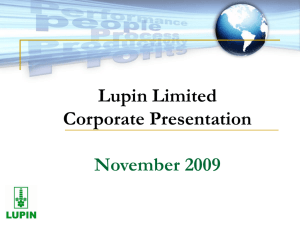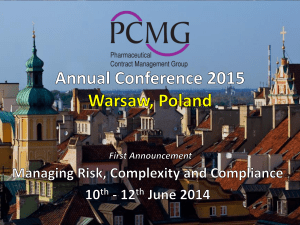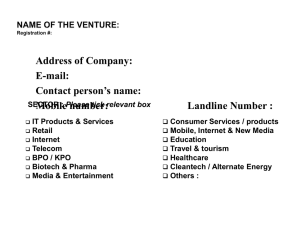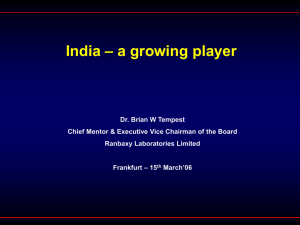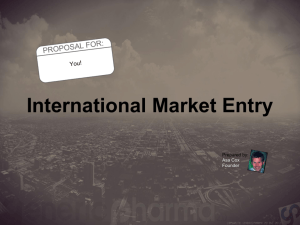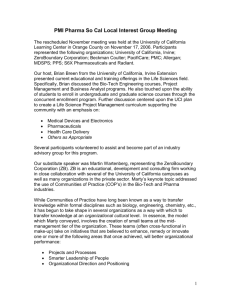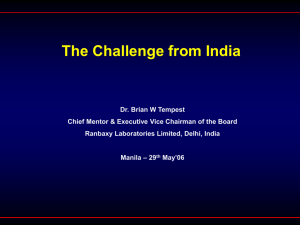Global Pharma Developments-Challenges and Opportunities
advertisement
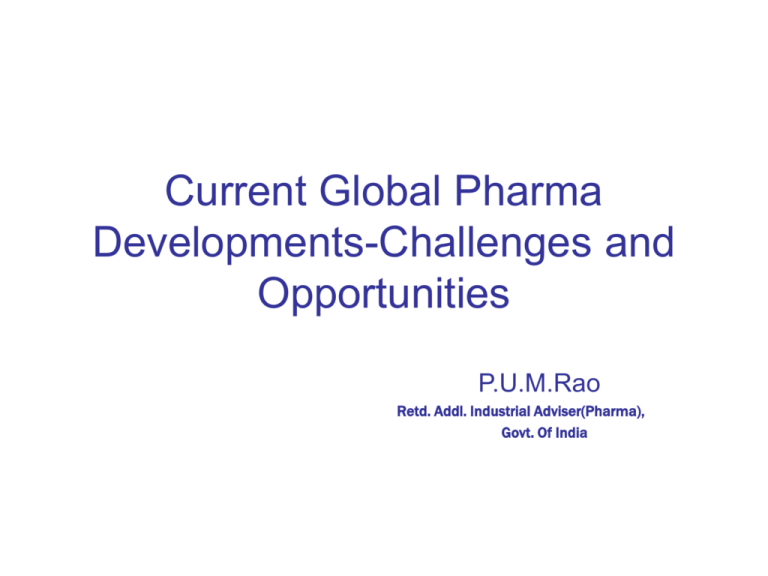
Current Global Pharma Developments-Challenges and Opportunities P.U.M.Rao Retd. Addl. Industrial Adviser(Pharma), Govt. Of India The Race for Quality has no finishing Line……… Global Pharma Industry 2008-09 • Global drug sales projected at $ 773 Bn with low growth of 4.8% in 2008.Further slowdown expected in 2009 • North America sales- $ 312 Bn, • Europe sales $ 247 Bn, Japan $ 76 Bn, • Latin America $ 47 Bn growing +12%, • Asia/Africa/Australia together $ 91 Bn growing +15% • patent expiries, slowdown in new product launches, hurdles imposed by payers on market access, world financial crisis are some reasons for reduced growth Global Pharma(contd) • Oncology top therapeutic class $ 48 Bn sales growing at 11%. To reach $75 - 80 Bn by 2012. • Aggregate value of biotechnology drugs sales +$ 75 Billion in 2007 are estimated to grow to $169 billion in 2014. • Lipid Regulators($ 34 Bn),Respiratory($ 31 Bn), Antidiabetics($ 27 Bn), Antiulcers( $ 26 Bn), CVD($ 23 Bn) are the other top groups • U.S. Prescription drug Sales which grew 1.3 Percent in 2008 to $ 291 Billion is expected to decline by 1-2 percent in 2009 Global Pharma Highlights • Top 50 pharmaceutical companies accounted for prescription drug sales of $ 558 billion in 2008. • New Drugs in development gone up to 9605( 2009) from 5930 (1998) • Currently there are 100 blockbuster drugs, 22 biotech products are part of this. • 32 NCEs launched in 2008 compared to 25 in 2007. Top Product Sales 2008($ Bn) Lipitor (atorvastatin) Plavix (clopidogrel) Nexium (esomeprazole) Seretide (fluticasone+salmeterol Enbrel (etanercept) Seroquel (quetiapine ) Zyprexa (olanzapine ) Remicade ((infliximab) Singulair (montelukast) Lovenox (enoxaparin) 13.6 8.6 7.8 7.7 5.7 5.4 5.0 4.9 4.6 4.4 Global Pharma Developments ● • • • • • • • Serious profit setbacks Mergers & Acquisitions. Prohibitive R&D costs Changing Regulatory environment Threat from generics More outsourcing Emergence of new players ICH-quality risk management Q8, Q9 and Q10 guidelines. Drug Patent Expiry 2009 Lansoprazole (Prevacid/Takepron/Zoton) Duloxetine (Cymbalta/XeriStar) Tamsulosin (Flomax/Omnic/Harnal) Perindopril erbumine (Coversyl/Aceon) Escitalopram oxalate (Lexapro/Cipralex) Anastrozole (Arimidex) 2010 Losartan potassium (Cozaar/Hyzaar) Atorvastatin calcium (Lipitor) Docetaxel (Taxotere) Gemcitabine (Gemzar) Lamivudine and zidovudine (Combivir) Pantoprazole (Protonix/Pantozol) Donepezil (Aricept) Levofloxacin Levaquin/Cravit/Tavanec) Big Pharma M & A Acquirer Acquired Value $ Mil Year Pfizer Warner 8880 1999 Glaxo SKB 7880 2000 Sanofi Aventis 6570 2004 Pfizer Wyeth 6800 2009 Roche Genentech 4700 2009 Merck Schering 4110 2009 AstraZeneca Medimmune 1520 2007 Indian Pharma Profile Current Indian pharma export profile Exports of Drugs, Pharma and Finechem amounted to Rs 32051 Crores during 2008-09 (Apr -_Jan) The Biopharma exports touched Rs 3999 Crores in 2007-08 Exports to over 200 destinations including small islands like Kiribati Europe, North America together account for half of exports Share of dosage exports 52% - a noteworthy achievement World’s No. 1 Pharma market USA also India’s top destination Africa is biggest with 54 destinations Global presence of India in the critical antiretroviral supply is now part of history. Major export destinations (value Rs Mil) Country 2007- 08 2008- 09 (Apr- Jan) Share %dosage forms(2007-08) USA 58393 56686 65 Germany 14489 11773 31 Russia 11990 11977 94 UK 11465 9835 70 China 8794 4653 10 Brazil 7716 8645 47 Canada 7380 9217 16 South Africa 6843 9353 72 Nigeria 6441 8607 87 Netherlands 5227 5500 42 Major API Exports(2007-08) Product group Rs. Crores Menthol Amoxycillin Cephalexin Erythromycin 640 562 196 173 Ibuprofen Ciprofloxacin Ampicillin 149 123 138 Ranitidine Ephedrines 131 90 Major Dosage Form exports (2007-08) Product Group All Antiinfectives Vitamins Analgesics,Antipyretics Cardiovasculars Antiulcers Antiasthamatics Hormonals+Insulin Anticancers Veg. Alkaloids Rs. Crores 4600 798 791 645 452 347 315 251 157 Government Initiatives for Pharma sector • • • • • • • • • 100 % FDI permitted through Automatic route Technology freely importable both Lumpsum, Royalty applicable Foreign Trade policy instruments-Advance Authorisation, DEPB, EPCG Export facilitation- MAI, MDI New moves - Focus Markets, R&D initiatives – funding In house R&D recognition Modernisation Registration system streamlined for import of drugs - both site and product registration • product patents for drugs, food and agrochemicals since 2005 Global Generic industry • Global generics Sale $78 billion as per IMSH. Growth down to 3.6 % from 11.4 % in 2007 • top eight global markets – the U.S., Germany, France, the U.K., Canada, Italy, Spain and Japan account for 84 percent of total generics sales . • Generics growth 10.2 % in Japan, 16.9 % in France, 12.5 % in Italy and 10.5 % in Spain. • Top 10 generics companies 47 percent share of the generics market worldwide. • Three leading generics manufacturers – Teva ( 11 % market share), Sandoz ( 9 %) and Mylan ( 8 %). • Generics companies to benefit as products generating $139 billion in branded sales in the top eight world markets lose their patent protection through 2012 Country $ Billion USA 33 Top 5 Europe 22 EU 31 Japan 3 Australia 2 generic medicine policies of European governments I. Countries with a coherent generic medicines policy Sweden, UK, Denmark, France II. Generic medicines competition within existing regulatory frameworks Poland, Netherlands, Denmark Germany, UK, Sweden III. Countries with incentives for physicians to prescribe generic medicines Germany, France, UK, Sweden IV. Countries with incentives for pharmacists to dispense generic medicines Netherlands, Denmark, UK, Italy France, Poland, Sweden V. Countries with incentives for patients to demand generic medicines Italy, Denmark, Germany Sweden, France, Poland Source- EGA Opportunities • Why New Markets - what’s happening in US, Europe • Outsourcing opportunities. Collaboration, Tie ups • BT Acquisitions • Prevalence of Different Strategies – • Growth Areas for products • Eco-innovation driving greener product development • Cooperate not compete model • FTAs- Setting up JVs to access new markets. Concept to Goal of ASEAN pharmaceutical harmonization • $ 13 Billion ASEAN pharma market presents growing opportunities • 10 ASEAN member countries formed PPWG in 1999 – A Partnership of Indonesia, Malaysia, Singapore, Thailand, Philippines, South Korea, Vietnam, Laos, Mynamar, Brunei • Studied harmonization of procedures and regulatory system towards achieving MRA • ASEAN CTD and other regulatory parameters like BA adopted • Implementation through Working Group based on consultations and consensus • Resources, Training taken care off • ASEAN GMP finally in place through a decade of dedicated exercise • Implementation January 2011 Impediments Non Tariff Barriers Effect of Free trade agreements Growing imports. Absence of regulatory cooperation Pricing pressures in US. New approach by overseas API Mfrs - risk strategy Take over Blues Authorized Generics REACH Increased FDA scrutiny of overseas API facilities Lack of Accreditation of Indian testing labs by vendors Thank you
